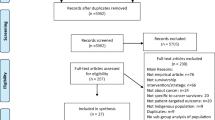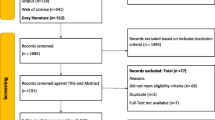Abstract
Objective
There are few support programs with evidence-based practices which address the needs of cancer survivors from indigenous populations. This systematic review analysed the experiences and current support services for cancer survivors from indigenous populations following the cessation of cancer treatment.
Methods
The data sourced for this article was identified from a systematic search of five databases (MEDLINE, MEDLINE In-Process, PyscINFO, CINAHL, and EMBASE). Studies were selected if they described the experiences of indigenous cancer survivors, their families, and/or clinicians primarily responsible for their care. In total 208 unique abstracts were screened, from which 17 studies were identified as having fulfilled all selection criteria.
Results
Of the 17 articles reviewed, 12 described qualitative data and 5 provided quantitative data. Common themes identified included the importance of family support throughout the survivorship period, the negative effect of community stigmatization, fatalistic attitudes towards cancer, and the importance of spirituality in coping with, and understanding, the cancer experience. Potential barriers to accessing care included distance and difficulties revisiting the survivor’s cancer experience due to an associated fear of cancer recurrence.
Conclusions
Indigenous cancer survivors would benefit from survivorship programs more specifically tailored to their individual circumstances, such as personalized spiritual care, facilitation of increased involvement of family members, and connection to other indigenous cancer survivors.
Implications for Cancer Survivors
The results from this review indicate that there is a need for survivorship care to be shaped specifically for the needs of indigenous cancer survivors.

Similar content being viewed by others
References
Australian Bureau of Statistics, The health and welfare of Australia's Aboriginal and Torres Strait Islander peoples 2005. A.B.o. Statistics, Editor 2005: Canberra.
Haynes, M. and B. Smedley, The unequal burden of cancer. An assessment of NIH research and programs for ethnic minorities and the medically underserved. N.A. Press, Editor 1999, Institute of Medicine: Washington, DC
AIHW, Cancer Australia. Cancer in Aboriginal and Torres Strait Islander peoples of Australia: an overview. AIHW, Editor 2013: Canberra.
Cobb N, Espey D, King J. Health behaviors and risk factors among American Indians and Alaska Natives, 2000–2010. Am J Public Health. 2014;104(3):22.
White MC et al. Disparities in cancer mortality and incidence among American Indians and Alaska Natives in the United States. Am J Public Health. 2014;104(S3):S377–87.
Perdue DG et al. Geographic variation in colorectal cancer incidence and mortality, age of onset, and stage at diagnosis among American Indian and Alaska Native people, 1990–2009. Am J Public Health. 2014;104(S3):S404–14.
Singh SD et al. Ovarian and uterine cancer incidence and mortality in American Indian and Alaska Native women, United States, 1999–2009. Am J Public Health. 2014;104(S3):S423–31.
Plescia M et al. Lung cancer deaths among American Indians and Alaska Natives, 1990–2009. Am J Public Health. 2014;104(S3):S388–95.
White A et al. Breast cancer mortality among American Indian and Alaska Native women, 1990–2009. Am J Public Health. 2014;104(S3):S432–8.
Watson M et al. Cervical cancer incidence and mortality among American Indian and Alaska Native women, 1999–2009. Am J Public Health. 2014;104(S3):S415–22.
Hoffman RM et al. Prostate cancer deaths and incident cases among American Indian/Alaska Native men, 1999–2009. Am J Public Health. 2014;104(S3):S439–45.
Li J et al. Kidney cancer incidence and mortality among American Indians and Alaska Natives in the United States, 1990–2009. Am J Public Health. 2014;104(S3):S396–403.
Wiggins CL et al. Gastric cancer among American Indians and Alaska Natives in the United States, 1999–2004. Cancer. 2008;113(S5):1225–33.
Guadagnolo, B.A., et al., Assessing cancer stage and screening disparities among Native American cancer patients. Public Health Reports (Washington, D.C.: 1974), 2009. 124(1): p. 79–89.
Oeffinger KC, McCabe MS. Models for delivering survivorship care. J Clin Oncol. 2006;24(32):5117–24.
Cox A, Faithfull S. ‘They’re survivors physically but we want them to survive mentally as well’: health care professionals’ views on providing potential late effect information. Support Care Cancer. 2013;21(9):2491–7.
Herman D et al. Obesity and cardiovascular risk factors in younger breast cancer survivors: the Cancer and Menopause Study (CAMS). Breast Cancer Res Treat. 2005;93(1):13–23.
Jones LW et al. Cardiopulmonary function and age-related decline across the breast cancer survivorship continuum. J Clin Oncol. 2012;30(20):2530–7.
Rugo HS, Ahles T. The impact of adjuvant therapy for breast cancer on cognitive function: current evidence and directions for research. Semin Oncol. 2003;30(6):749–62.
Maher EJ, Makin W. Life after cancer treatment–a spectrum of chronic survivorship conditions. Clin Oncol (R Coll Radiol). 2007;19(10):743–5.
Morgan MAPA. Cancer survivorship: history, quality-of-life issues, and the evolving multidisciplinary approach to implementation of cancer survivorship care plans. Oncol Nurs Forum. 2009;36(4):429–36.
Shapiro C et al. The LIVESTRONG Survivorship Center of Excellence Network. J Cancer Surviv. 2009;3(1):4–11.
Hollen P, Hobbie W. Establishing comprehensive specialty follow-up clinics for long-term survivors of cancer. Providing systematic physiological and psychosocial support. Support Care Cancer. 1995;3(1):40–4.
Bui LL et al. Interest and participation in support group programs among patients with colorectal cancer. Cancer Nurs. 2002;25(2):150–7.
Owen JE et al. Use of health-related and cancer-specific support groups among adult cancer survivors. Cancer. 2007;109(12):2580–9.
Kramer BJ. American Indian families and home care: macro social and cultural considerations. Alaska Med. 1995;37(4):139–41.
Shahid S et al. 'Nowhere to room … nobody told them': logistical and cultural impediments to Aboriginal peoples' participation in cancer treatment. Aust Health Rev. 2011;35(2):235–41.
Shahid S, Finn L, Thompson S. Barriers to participation of Aboriginal people in cancer care: communication in the hospital setting. Med J Aust. 2009;190(10):574–9.
AIWH, The health and welfare of Australia’s Aboriginal and Torres Strait Islander people: an overview 2011. , 2011: Canberra.
Jackson C, Cheater FM, Reid I. A systematic review of decision support needs of parents making child health decisions. Health Expect. 2008;11(3):232–51.
Braun KL et al. Supports and obstacles to cancer survival for Hawaii's native people. Cancer Pract. 2002;10(4):192–200.
Burhansstipanov L et al. An innovative path to improving cancer care in Indian country. Public Health Rep (1974-). 2001;116(5):424–33.
Hodge FS et al. “Weaving balance into life”: development and cultural adaptation of a cancer symptom management toolkit for Southwest American Indians. J Cancer Surviv. 2012;6(2):182–8.
Johnson SR et al. Cancer, employment, and American Indians: a participatory action research pilot study. Rehabil Couns Bull. 2011;54(3):175–80.
Kaòpua LSI, Mitschke DB, Kloezeman KC. Coping with breast cancer at the nexus of religiosity and Hawaiian culture: perspectives of native Hawaiian survivors and family members. J Relig Spiritual Soc Work: Soc Thought. 2008;27(3):275–95.
Santos L et al. ‘Imi Hale: establishing an inheritance for Native Hawaiians on cancer awareness, research and training. Pac Health Dialog. 2001;8(2):436–45.
Eide P. Native Hawaiian women and the experience of breast cancer. Women Health. 2006;44(4):41–59.
Bauer JE et al. American Indian cancer survivors: exploring social network topology and perceived social supports. J Cancer Educ. 2005;20(1 Suppl):23–7.
Pelusi J, Krebs LU. Understanding cancer-understanding the stories of life and living. J Cancer Educ. 2005;20(1 Suppl):12–6.
Burhansstipanov L et al. Comparison of quality of life between native and non-native cancer survivors: native and non-native cancer survivors' QOL. J Cancer Educ. 2012;27(1):012–0318.
Burhansstipanov L et al. Native American breast cancer survivors' physical conditions and quality of life. Cancer. 2010;116(6):1560–71.
Braun KL et al. Building Native Hawaiian capacity in cancer research and programming. A legacy of 'Imi Hale. Cancer. 2006;107(8 Suppl):2082–90.
Doorenbos AZ et al. Developing the native people for cancer control Telehealth network. Telemed J E Health. 2011;17(1):30–4.
Doorenbos AZ et al. Satisfaction with Telehealth for cancer support groups in rural American Indian and Alaska Native communities. Clin J Oncol Nurs. 2010;14(6):765–70.
Warson E. Healing pathways: art therapy for American Indian cancer survivors. J Cancer Educ. 2012;27(1):012–0324.
Tilburt, J.C., et al., Caring for Alaska Native prostate cancer survivors in primary care: a survey of Alaska Tribal Health System providers. Int J Circumpolar Health, 2014. 73(23637).
Long C et al. Assessing cultural life skills of American Indian youth. Child Youth Care Forum. 2006;35(4):289–304.
McLaughlin LA, Braun KL. Asian and Pacific Islander cultural values: considerations for health care decision making. Health Soc Work. 1998;23(2):116–26.
Schwartz SH, Bilsky W. Toward a theory of the universal content and structure of values: extensions and cross-cultural replications. J Pers Soc Psychol. 1990;58(5):878–91.
Bloom JR, Spiegel D. The relationship of two dimensions of social support to the psychological well-being and social functioning of women with advanced breast cancer. Soc Sci Med. 1984;19(8):831–7.
Glajchen M. The emerging role and needs of family caregivers in cancer care. J Support Oncol. 2004;2(2):145–55.
Kazak AE et al. Surviving Cancer Competently Intervention Program (SCCIP): a cognitive-behavioral and family therapy intervention for adolescent survivors of childhood cancer and their families. Fam Process. 1999;38(2):176–91.
Alfano CM, Rowland JH. Recovery issues in cancer survivorship: a new challenge for supportive care. Cancer J. 2006;12(5):432–43.
Bultz BD et al. A randomized controlled trial of a brief psychoeducational support group for partners of early stage breast cancer patients. Psycho-Oncology. 2000;9(4):303–13.
Toseland RW, Blanchard CG, McCallion P. A problem solving intervention for caregivers of cancer patients. Soc Sci Med. 1995;40(4):517–28.
Fernandez ME et al. Evaluation of ENCOREplus: a community-based breast and cervical cancer screening program. Am J Prev Med. 1999;16(3):35–49.
Chilton JA et al. Circle of Sisters: raising awareness of Native American women to breast cancer. J Health Care Poor Underserved. 2013;24(3):1167–79.
Hampton JW. Cancer in Indian country–keynote address. Alaska Med. 1993;35(4):243–4. 272.
Thewes B et al. Current approaches to managing fear of cancer recurrence; a descriptive survey of psychosocial and clinical health professionals. Psychooncology. 2014;23(4):390–6.
Sanchez TR, Plawecki JA, Plawecki HM. The delivery of culturally sensitive health care to Native Americans. J Holist Nurs. 1996;14(4):295–307.
Division of Cancer Prevention and Control. The National Action Plan for Cancer Survivorship. Cancer Prevention and Control 2013 [cited 2014 11/04]; http://www.cdc.gov/cancer/survivorship/pdf/plan.pdf
Campbell MK et al. Adult cancer survivorship care: experiences from the LIVESTRONG centers of excellence network. J Cancer Surviv. 2011;5(3):271–82.
Braun KL et al. Cancer patient navigator tasks across the cancer care continuum. J Health Care Poor Underserved. 2012;23(1):398–413.
Matsuno RK et al. Complementary and alternative medicine use and breast cancer prognosis: a pooled analysis of four population-based studies of breast cancer survivors. J Womens Health. 2012;21(12):1252–8.
Acknowledgments
The authors would also like to acknowledge Lucy Hanlon for contribution to the article review and selection process and Brittany McGill for contribution to editing, and review, of this paper.
Financial disclosure
The authors have no relevant financial relationships to disclose.
Conflict of interest
The authors have no conflicts of interest to disclose.
Funding
The Behavioural Sciences Unit is supported by the Kids with Cancer Foundation. Claire Wakefield is supported by a Career Development Fellowship from the National Health and Medical Research Council of Australia (APP1067501) and an Early Career Development Fellowship form the Cancer Institute of NSW (ID 11/ECF/3-43). The Behavioural Sciences Unit is supported by the Kids with Cancer Foundation.
Author information
Authors and Affiliations
Corresponding author
Rights and permissions
About this article
Cite this article
Cavanagh, B.M., Wakefield, C.E., McLoone, J.K. et al. Cancer survivorship services for indigenous peoples: where we stand, where to improve? A systematic review. J Cancer Surviv 10, 330–341 (2016). https://doi.org/10.1007/s11764-015-0479-2
Received:
Accepted:
Published:
Issue Date:
DOI: https://doi.org/10.1007/s11764-015-0479-2




